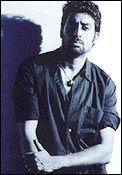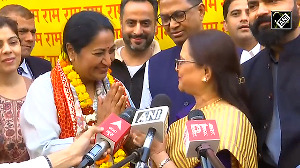 Disappointment, like all human emotion, is relative -- the greater the expectation aroused in you, the greater the corresponding sense of letdown.
Disappointment, like all human emotion, is relative -- the greater the expectation aroused in you, the greater the corresponding sense of letdown.
Few events in Indian cinema arouse as much expectation as a Mani Ratnam release. Consequently, there are few greater disappointments than that moment when you step out of a theatre screening the director's latest, and the only mode of expression left to you is a sigh.
Yuva -- which previewed in New York on Wednesday at the Times Square Loew's -- is the story of three young men rattling around like three atoms in the nuclear reactor that is Kolkata, and of the fateful moment when, on the bridge spanning the Hoogly river, their paths intersect, their lives collide in ways that alter their destinies.
All about Yuva: The Rediff Special
That is what Yuva -- reportedly inspired by a true incident/character at Osmania University -- purports to be about.
The main protagonist is Michael Mukherjee (Ajay Devgan), a child prodigy who passes up the chance to go to the US and do his doctorate under the guidance of a Nobel Laureate in order to remain in Kolkata and, true to the legacy of his revolutionary father, fight the injustice and corruption that roils his land.
![]()
Write your review!
![]()
![]()
![]()
![]()
Have you seen this film?Would you like to review it? Post your review now!![]()
![]()
The reverse of that coin is Lallan Singh (Abhishek Bachchan). A product of the times, he has known nothing but violence from childhood. His creed is simple -- the world will give him nothing he cannot, does not, snatch for himself.
Offsetting the black-and-white nature of the two central characters is Arjun Balakrishnan (Vivek Oberoi), a young man whose credo is to live life kingsize and the devil take the hindmost.
Each has a romantic interest. For Michael, it is childhood sweetheart Radhika (Esha Deol), who loves the perennial rebel in him. For Lallan, it is wife Sashi (Rani Mukerji), who endures physical and mental abuse at his hands, yet clings on because she sees, deep down in him, the spark of something human and hopes to haul him out of the mire (that there is no redemption for Abhishek's character is one of the disappointments of the film, and one of the reasons why audience identification will be less than complete).
For Arjun, it is Mira (Kareena Kapoor), the hip young girl whom he finds himself falling in love with, almost against his will.
Every story needs a catalyst. Here, it is the power-hungry politician (Om Puri), who uses the muscle of Lallan and his brother to enforce his writ on the city. That is as much as you can reveal of the plotline without playing spoiler.
The movie has its obvious pluses, in the often lush cinematography of Ravi K Chandran; the meticulously crafted sets of Sabu Cyril, who recreates Kolkata streets in a studio backlot with clinical perfection; and the stunt choreography of Vikram Dharma, who had the preview audience gasping in the long fight sequence that sets up the climax. Seven-time National Award-winning editor Sreekar Prasad's skill abets Dharma's sequences to perfection.
 Rahman's score attained hit status months before the movie's release, and a good thing, too. The songs are well worth repeated hearing on your music system. When inserted into the film, however, they jar. Among the crew, Brinda is the least over-worked -- there are no real eye-popping instances of choreography.
Rahman's score attained hit status months before the movie's release, and a good thing, too. The songs are well worth repeated hearing on your music system. When inserted into the film, however, they jar. Among the crew, Brinda is the least over-worked -- there are no real eye-popping instances of choreography.
Among the actors, Devgan has the most to do, and he takes a fair stab at doing it. The failure of the character to be entirely convincing belongs not to the actor, but to whoever thought to cast him as a college student.
The clearly ageing Devgan would have found 'young' an impossible act to pull off; he is further handicapped by the fact that his fellow students, who share the frame with him, are clearly a good dozen or more years younger than he looks.
(If the story had to revolve around college students, the Devgan character would have been eminently more believable as a fiery young professor -- assuming there was some pressing reason why he had to be cast in the role in the first place?)
Abhishek Bachchan, Hindi cinema's perennial IOU, takes us all the way to the bank in this film. He has to smoulder, look tough, bash people up, be the sort of man who allows his untamed passions full rein, and he gives it a fair go. Again, casting could have lent the character an extra edge -- Bachchan is too clean cut a guy to be fully convincing as a street tough, even with the embellishments of pumped up muscles and an embryo beard.
Of the girls, Rani Mukerji is the scene-stealer, playing her part with an assured touch. Kareena Kapoor underplays -- mercifully -- and thus comes across as far more palatable than her regular hammy self. Esha Deol is the surprise package among the troika. While hers is the least developed character, she still manages to show flashes of her inherited acting genes.
Of the supporting cast, Om Puri is competent as the Bengali politician; Anant Nag in the role of Arjun Balakrishnan's father has too little to do to deserve more than a passing mention in the footnotes.
The real weak link in the film is -- surprisingly -- director Mani Ratnam, who takes credit for the story and screenplay.
For the classicist, movie scripts have a three-act narrative arc; they build to a mid-movie plot point at which the story spins on its axis, takes on momentum and crescendos to the climax. In Yuva, that crucial plot point is logically the moment when the lives of the three young men intersect -- but the screenplay places that right at the beginning of the film, even before the audience has fully settled in.
The story then segues into three extended flashbacks, providing the back-story of the three central male characters. The device could possibly have worked had the flashbacks been crisp -- the director, however, indulges in over-elaboration to the point where, at the halfway stage, he has only managed to introduce two of the three characters, leaving the third flashback to the second half of the film.
Three quarters of the film's length is thus taken up in character sketches, in introducing the three young men and in telling you how they got to be who they are. That leaves the director less than half an hour of screen time to tell his story.
The result? A speeded-up denouement that leaves you puzzled -- what in heck was all the fuss about? And more importantly, what is the story about?
We learn that there is some by-election happening, and that four young men are contesting, in an attempt to try and change the system. Cool -- but where is the contest? Who is the opponent(s)? Where is the clash between the entrenched political mafia and the new, shining-with-promise brigade?
All about Yuva: The Rediff Special
 This entire area of the story -- which is what the film is purportedly about -- is disposed off in one extended fight scene, followed soon after by the announcement of a result you could see coming a mile off.
This entire area of the story -- which is what the film is purportedly about -- is disposed off in one extended fight scene, followed soon after by the announcement of a result you could see coming a mile off.
A sure sense of structure, narrative and pacing is a Mani Ratnam trademark; it is this strength that elevates earlier efforts such as Roja, Nayakan, Dalapathy and Kannathil Mutthamittal above the run of the mill fare.
It is thus doubly unfortunate that his earlier strength is Ratnam's greatest weakness here, and this weakness undermines the inherent promise of the film's theme.
Yuva might still do darn well at the turnstiles. After all, worse films have gone on to become superhits on the strength of the stars, the music, the fights, the costumes, or even the position of Mars in relation to Saturn.
(Without having seen the film, I suspect Yuva's Tamil twin, Aayitha Ezhuthu, might do even better, if only because of more believable casting. Surya (who plays the Ajay Devgan character) has the youthfulness and that rare combination of strength and vulnerability to pull off the rebellious college student. Madhavan, who started off as a chocolate box hero, did an about turn with a tough-guy role in Run, and chalked up a superhit with a very believable turn. And Siddharth is just right for the happy go lucky youngster who undergoes a life changing experience. Another hook for Tamil audiences is the casting of that doyen among Tamil directors, Bharati Raja, in the role played in the Hindi version by Om Puri.)
But diehard Mani Ratnam fans -- and when it comes to Mani I die harder than most -- will view this film as an aberration, a pretender. All sound and fury, amounting to not very much.






 © 2025
© 2025